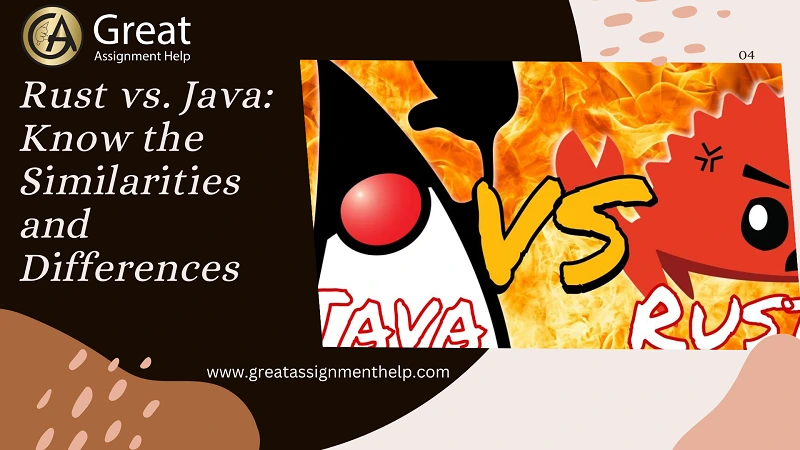In the programming world, Rust and Java are two popular languages that have their own set of advantages and disadvantages. Rust is notable for its memory safety features, whereas Java is known for portability and a large ecosystem. Although these languages have certain similarities, they mainly differ in areas like syntax, performance, memory management, and other aspects. If you are a developer, then it is common for you to get confused about what language to choose for your next project. In case, you are stuck in such a situation, continue reading this blog. Here, we have presented a comparative analysis of Rust vs. Java. Especially, by knowing the similarities and differences between Rust and Java, you can easily determine which language suits the best for your project.
What is Rust?
Rust is a multi-paradigm programming language aimed at providing developers with quick, secure, and concurrent software development. It was created to be a better alternative to C and C++ by solving some of its shortcomings, such as memory safety, concurrency, and speed.
The memory-safe capabilities of Rust allow developers to avoid typical programming problems like null pointer references, buffer overflows, and data races. Additionally, the language supports several programming paradigms, including functional and object-oriented programming.
Rust’s rising popularity can be due to its simplicity, great performance, and ability to develop system-level applications while maintaining safety and security.
What is Java?
Java is a widely used general-purpose programming language that was meant to be simple, portable, and secure. It is a popular object-oriented programming language for creating workplace applications, online applications, mobile apps, and games.
Since Java is platform-independent, developers can create code once and run it on any platform that supports the Java Virtual Machine (JVM). Especially, the comprehensive libraries and frameworks of the language like Spring and Hibernate offer developers strong tools for constructing robust and scalable applications.
In particular, features like ease of use, dependability, and adaptability make Java a popular choice for a wide range of applications.
Differences between Rust and Java

Rust and Java will show significant variations in memory management, performance, and several other features. In this section, let us learn the major differences between Rust and Java.
Rust vs. Java: Primary Features
Rust and Java are two different programming languages that have a unique set of features. Here, let us look at the primary features of JavaScript vs. Ruby.
Features of Rust
- Without a garbage collector, Rust maintains memory safety. This is made possible by its ownership system. Typically, every value in Rust has a single owner, who will determine the value’s scope. The value will be lost when the owner exits the scope.
- The concurrency mechanism in Rust ensures that data races are caught during compilation. As a result, concurrent programming is more secure and efficient.
- Variables are immutable by default in Rust. This implies that once a value is set to them, it cannot be modified. Here, the ‘mut’ keyword must be used to make a variable changeable.
- Rust has robust pattern-matching capabilities that may be utilized in a variety of situations such as destructuring and control flow.
- Rust offers abstractions with no runtime cost. As a result, performance won’t suffer while you create high-level code.
These are only a few key features that make Rust a strong and effective language for systems development. As you learn more about Rust, you’ll get to know many more tools and methods for improving your coding experience.
Also read: Swift vs. Java: A Comprehensive Analysis of the Differences
Features of Java
- Java is platform-independent. It achieves “Write Once, Run Anywhere” (WORA) with the Java Virtual Machine (JVM). In specific, Java allows bytecode to execute on any operating system or device that contains a JVM.
- Java is an object-oriented language that encourages the use of objects and classes. With this method, the code becomes modular, organized, and reusable.
- To allow developers to perform numerous actions at the same time, Java supports multithreaded programming capability,
- Java has a large standard library that includes pre-compiled classes and methods for typical programming tasks.
- Java enables automated memory management via its garbage collector, which deletes unused objects automatically and reduces memory leaks.
For decades, Java’s features, paired with its durability and ease of use, have made it a favorite programming language among developers. Moreover, Java also provides a dependable and adaptable platform for developing web applications, mobile apps, and business software.
Rust vs. Java: Performance
While comparing Rust and Java, it is important to analyze how each language handles different jobs. Generally, the intrinsic design principles of both Java and Rust lead to certain differences in memory usage, execution speed, and overall efficiency. Here, let us look in detail at the comparison of Rust and Java in terms of performance.
Memory Management
Memory management in Rust is clear and relies on its ownership system. This frequently results in more efficient memory utilization. On the other hand, to manage memory, Java employs a garbage collector. This makes memory management easier for developers. Also, it may incur overhead.
Compilation and Execution Speed
Rust Programming Language is a compiled language that converts source code into machine code. This frequently leads to quicker execution times. But, Java compiles to bytecode, which the Java Virtual Machine (JVM) interprets. This extra layer might occasionally cause slower execution speeds.
Optimization
Cargo, Rust’s compiler is recognized for aggressive optimizations that ensure very efficient machine code. On the other hand, Java’s Just-In-Time (JIT) compiler may optimize bytecode during runtime and respond to the current state and workload of the system.
Concurrency
The concurrency mechanism in Rust is meant to eliminate data races during compilation, making concurrent programming both safe and efficient. Java has multithreading and synchronization capabilities.
To summarize, Rust frequently outperforms Java in terms of raw performance and memory economy because of its direct compilation and ownership model. However, Java’s portability and developed ecosystem make it a strong competitor, particularly for large-scale applications. Therefore, the ideal choice completely relies on your project’s requirements and constraints.
Rust vs. Java: Memory Management
Memory management is an important feature of any programming language because it determines how effectively a program uses system resources. Both Rust and Java take various approaches to memory management, each with its own set of advantages and disadvantages. Find here, the comparison of Rust and Java in terms of memory management.
To manage memory, Rust implements a special ownership system. This system guarantees that each value in Rust has a single owner, and memory is recovered automatically when the owner exits the scope. But, Java manages memory via garbage collection. Developers no longer have to manually handle memory management activities since the Java Virtual Machine (JVM) automatically reclaims memory that is no longer in use.
Borrowing is another distinctive feature of Rust. Instead of transferring ownership, Rust allows many portions of the code to access data without violating the ownership constraints. While garbage collection is the primary memory management strategy in Java, several Java modules and frameworks employ reference counting as an alternate memory management technique. Objects keep track of how many references they have, and when this number reaches zero, the object will be immediately deallocated.
To summarize, Rust’s memory management is centered on its ownership and borrowing system, which ensures safety and efficiency whereas Java’s garbage collection provides convenience at the expense of occasional overhead. Choosing amongst them is determined by the application’s particular demands and performance requirements.
Also read: What is the difference between Java and JavaScript?
Rust vs. Java: Concurrency and Parallelism
Concurrency and parallelism are basic concepts in modern programming because they are focused on increasing efficiency and performance in multi-core machines. Although they take different approaches to these concepts, both Java and Rust provide tools and frameworks to manage them.
To achieve fearless concurrency, Rust was created. It offers tools for writing concurrent programs that are free from indefinable behavior and data races. But, Java comes with built-in multithreading features that make it simple for developers to start and maintain numerous threads.
Rust provides channels as a secure way for thread communication. By doing this, data races between threads are prevented when sending data. However, to prevent data races, Java has synchronized methods that limit the number of threads that can use the method at once.
To sum up, both Rust and Java provide strong tools and concepts for dealing with concurrency and parallelism. Rust’s emphasis on safety guarantees that concurrent programs avoid typical mistakes, whereas Java’s robust ecosystem provides a diverse set of tools for multithreaded programming.
Rust vs. Java: Ecosystem and Libraries
A programming language’s strength is frequently found in its ecosystem and the availability of libraries. Both Rust and Java have diverse ecosystems, but they serve different purposes and have grown in different ways.
Cargo, Rust’s package management, makes it easier to manage dependencies, build projects, and even publish libraries. Crates.io, the central repository for Rust libraries (or “crates”), is supported by the Rust community. But for dependency management, Java has a developed ecosystem with tools like Maven and Gradle. Maven Central is the major repository for Java libraries, where developers may access a wide range of libraries for a variety of uses.
With frameworks like Rocket and Actix, Rust is slowly emerging in the web development area. These frameworks provide tools for the development of sophisticated web applications. On the other hand, in enterprise-level applications, Java’s ecosystem thrives. Spring and Hibernate frameworks dominate the scene and provide complete tools for web development and database administration.
Rust vs. Java: Database Connectivity
Database connection is essential in many applications, and both Rust and Java provide solid methods for interacting with diverse databases.
Diesel is a well-known ORM (Object-Relational Mapping) library in Rust. It enables developers to interface with databases in a type-safe way, guaranteeing that queries are efficient and error-free.
JDBC (Java Database Connectivity) is a standard API for connecting to relational databases in Java. JPA (Java Persistence API) provides an ORM solution on top of JDBC. JPA is implemented by libraries such as Hibernate that allow developers to interface with databases using Java objects.
Rust vs. Java: Use Cases
When comparing Rust versus Java, it is critical to evaluate the fields in which each language shines. Both languages offer advantages that make them appropriate for various activities and projects.
Rust is well-known for its systems programming abilities. Moreover, because of its memory safety features and low-level control, Rust is perfect for developing operating systems, embedded devices, and gaming engines. But, the power of Java is in enterprise applications. Its platform-independent nature along with the established frameworks such as Spring and Hibernate makes it the best choice for large-scale business applications.
Rust is quickly becoming a popular language for Web Assembly development. WASM enables high-performance web applications, and hence Rust’s efficiency is well-suited to this area. On the other hand, Java is the major programming language used in Android development. Java, with its wide ecosystem and tools like Android Studio, provides everything that is required for the development of top-tier mobile applications.
The ownership concept of Rust lends itself well to concurrent computation. Multithreaded code may be written by developers without the usual hazards associated with concurrency. Java is important in big data and cloud computing. Furthermore, Java is the language of choice for large-scale data processing frameworks such as Hadoop and Spark.
In summary, Java rules the fields of corporate applications, mobile development, and large data processing, whereas Rust shines in systems programming, web assembly, and parallel computing. The particular needs of the project should determine which option is best.
Also read: Java Vs. Python: Which Of The Two Is Worth Learning?
Similarities between Rust and Java
Rust and Java appear to have some syntax similarities. Curly brackets are used to identify code blocks in both languages, while semicolons; are used to end statements.
Rust is a systems programming language, whereas Java is predominantly an object-oriented language. However, Rust enables certain object-oriented features.
For error management, Java employs exceptions, whereas Rust employs a type system approach using Result and Option types.
In conclusion, even if Java and Rust have different features and paradigms, knowing their similarities and contrasts will help you migrate between them more easily. Whether you’re a Java developer interested in Rust development or vice versa, being aware of these similarities may be quite helpful.
Rust vs. Java: Which is better?
Both the classic Rust and Java are unique in their ways. But choosing which one is better is the most challenging task. If you need a high-performance system program for working on real-time applications, you can select Rust. In case, you are working on cross-platform projects or developing enterprise-level software, then Java is the best option for you. When compared to Rust, Java is versatile, reliable, and has a proven track record.
Whenever, you find it difficult to choose the right programming language for your project, go through your requirements carefully and get a complete understanding of it. Once you gain comprehension, by your requirements, pick an appropriate language.
Also read: Best Java Project Ideas for Beginners and Experts
Conclusion
We hope you are now clear about the similarities and differences between Rust and Java. In case, you have any doubts regarding them, contact us right away for clarification. Especially, for all kinds of programming assignments and projects, the coding experts from our platform will provide the best assistance at a nominal price, without missing a deadline. Also, note that the solutions that our subject professionals provide you will be accurate and error-free.


